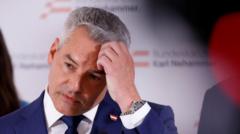In a significant political shift, Austrian Chancellor Karl Nehammer of the conservative People's Party (ÖVP) has announced his resignation as both chancellor and party leader. This decision follows the breakdown of coalition discussions with the Social Democrats, primarily due to disagreements over essential policy issues. The liberal Neos, also part of the negotiations, withdrew their involvement, exacerbating the already precarious political situation.
The backdrop of this political upheaval is the recent general election held in September, where the far-right Freedom Party (FPÖ) achieved substantial success, securing nearly 29% of the vote, followed closely by ÖVP at 26.3%, and the Social Democrats at 21%. Despite its electoral success, the FPÖ has been shut out from coalition talks with other parties, primarily due to concerns surrounding its past associations and policy positions.
The Freedom Party’s leader, Herbert Kickl, has criticized the stalled negotiations, stating that the process has resulted in "chaos" rather than the anticipated stability. He has called for resignations from both Social Democrat leader Andreas Babler and President Alexander Van der Bellen, implicating them in the ongoing political impasse.
Analysts have speculated that the failure of coalition talks may compel the ÖVP to consider forming an alliance with the FPÖ, despite the political risk that could provoke among the electorate and within Austria’s political landscape. Public sentiment appears to be shifting, with the FPÖ gaining popularity amid rising concerns over migration, asylum policies, and the economic challenges stemming from the war in Ukraine.
The FPÖ's campaign promises have echoed themes of national security and economic restoration, advocating for stricter immigration controls and policies aimed at "remigration" of asylum seekers. This focus creates a stark contrast to the previous efforts of Austria's mainstream parties and highlights the growing polarization within the country.
The political dynamics in Austria remain fluid, as the potential for new elections looms. The next strategic moves by the ÖVP and FPÖ will be closely monitored as the country grapples with questions of governance, alliance formation, and its broader socio-political identity in the face of changing voter sentiment.
The backdrop of this political upheaval is the recent general election held in September, where the far-right Freedom Party (FPÖ) achieved substantial success, securing nearly 29% of the vote, followed closely by ÖVP at 26.3%, and the Social Democrats at 21%. Despite its electoral success, the FPÖ has been shut out from coalition talks with other parties, primarily due to concerns surrounding its past associations and policy positions.
The Freedom Party’s leader, Herbert Kickl, has criticized the stalled negotiations, stating that the process has resulted in "chaos" rather than the anticipated stability. He has called for resignations from both Social Democrat leader Andreas Babler and President Alexander Van der Bellen, implicating them in the ongoing political impasse.
Analysts have speculated that the failure of coalition talks may compel the ÖVP to consider forming an alliance with the FPÖ, despite the political risk that could provoke among the electorate and within Austria’s political landscape. Public sentiment appears to be shifting, with the FPÖ gaining popularity amid rising concerns over migration, asylum policies, and the economic challenges stemming from the war in Ukraine.
The FPÖ's campaign promises have echoed themes of national security and economic restoration, advocating for stricter immigration controls and policies aimed at "remigration" of asylum seekers. This focus creates a stark contrast to the previous efforts of Austria's mainstream parties and highlights the growing polarization within the country.
The political dynamics in Austria remain fluid, as the potential for new elections looms. The next strategic moves by the ÖVP and FPÖ will be closely monitored as the country grapples with questions of governance, alliance formation, and its broader socio-political identity in the face of changing voter sentiment.
















